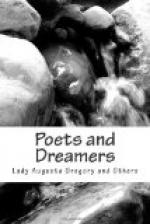’While the Irish boy
is on the shore,
He’ll help
to crush the stranger;
He’ll sweep them hence
for evermore,
And free thy land
from danger.
And then he’ll pray
to God above,
That his courage
ne’er shall falter,
To guard him to the land he
loves—
To Ireland o’er
the water.’
Mayo is the county to which John MacBride, the leader of the Irish Brigade, belongs; but I heard of a ballad-singer at Ballindereen, near my Galway home, the other day, whose refrain was:—
’And Erin watches from
afar, with joy and hope and pride,
Her sons who strike for liberty,
led on by John MacBride!’
At Galway Railway Station, whence the Connaught Rangers set out for the war, I have heard that wives, saying good-bye, begged their husbands ‘not to be too hard on the Boers.’ Anyhow, a ’Mother’s lament for her son gone to the war,’ that was sung at Galway Races the other day, shows more impartiality than most of the ballads:—
’When the battle rages
fiercely, our boys are in the van;
How I do wish the blows they
struck were for dear Ireland!
But duty calls, they must
obey, and fight against the Boer,
And many a cheerful Irish
lad will fall to rise no more.
’I wish my boy was home
again! Oh! how I’d welcome him,
With sorrow I’m broken-hearted,
my eyes are growing dim;
The war is dark and cruel,
but whoever wins the fight,
I pray to save my noble lad,
and God defend the right!’
But it is the small farmers of Ireland who look with special sympathy on their fellows in the Transvaal. They give them a warning:—
’England sends her grabbers,
From far across
the sea,
To rob you of your friends
and home,
Likewise your
liberty.’
And the Boers say in answer:—
’When we came to this
country,
’Twas but
a barren plain;
But the honest hand of labour
Was rewarded for
its pain.
We found the precious metal,
And of it we have
great store;
But Britain came to rob us
As she often done
before.
As
she thought to do before,
As
she thought to do before;
But Britain comes to rob us,
As she often done
before.’
Another ballad explains:—
’Those Boers can’t
be blamed, as you might understand;
They are trying to free their
own native land,
Where they toil night and
day by the sweat of their brow,
Like the farmers in Ireland
that follow the plough.
Farewell to Old Ireland, we
are now going away,
To fight the brave Boers in
South Africa;
To fight those poor farmers
we are not inclined:
God be with you, Old Ireland,
we are leaving behind.’
Some verses—’The Boer’s Prayer’—that I have not seen on a ballad-sheet, but in a weekly paper, give better expression to this feeling of farmer sympathy:—




